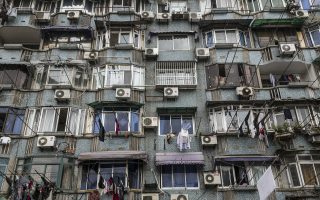
A building in China marked by several window-unit air conditioners. AC units like these can cause moisture buildup and offer the bacterium that causes legionnaire's disease a habitat in which to multiply.
At US Air Purifiers, we often get questions about using air purification systems to prevent or reduce the symptoms of specific diseases. While asthma, the cold, flu and other such common diseases are the ones we get asked about most often, there are many rarer diseases that are just as important, if not more so, to protect yourself against. One of these is a little-known illness known as legionnaire’s disease, which is a type of bacterial pneumonia. In this article, we’ll be answering all of your questions about this rare disease, including:
- What is legionnaire’s disease?
- How does someone get legionnaire’s disease?
- How can I protect myself against it?
- Just how common is it?
What is Legionnaire’s Disease and How Do You Get It?
Legionnaire’s disease is among the diseases that was not discovered until relatively recently. It takes its name from the source of its discovery, an annual meeting of the American Legion in Philadelphia that took place in 1976. After the convention was over, legionnaires who had attended it began falling ill and dying, with several fatalities eventually occurring. The cause was eventually discovered to have been a form of bacteria, afterwards called legionella, that had been present in the air conditioning system of the hotel that hosted the convention.
Unlike some diseases, legionnaire’s disease isn’t spread person-to-person, but instead by inhaling legionella in water vapor. This transmission method is a large part of what makes air conditioning systems, which condense moisture during the cooling process, such good mechanisms for the spread of the disease. Left untreated, the bacteria will cause severe pneumonia, muscular aches, severe coughing (often with blood) and a range of other possible symptoms. Hospitalization and professional medical treatment is almost always required.
Protecting Yourself From Legionnaire’s Disease
Since the bacterium that causes legionnaire’s disease is transmitted through airborne water, one of the best ways to prevent the disease is to ensure that there is not a source of standing water in your home that could offer legionella a habitat. Common culprits include leaks from air conditioning units, contaminated water pipes and pools, spas or hot tubs that are not being properly treated.
Protecting yourself from legionnaire’s disease is difficult, given the fact that all homes will require at least some water. However, there are certain steps you can take to lower the chance of bacterial contamination occurring. First and foremost, be sure you have your central air and heating system inspected on a regular basis. Standing water leaking from a central HVAC system can provide an ideal habitat for legionella. Fortunately, modern air systems are designed to prevent this, so a basic inspection will confirm that no standing water issues are occurring.
For increased protection, you can also use a high-grade air purifier. Any purifier with a UV antimicrobial lamp will be able to kill off the bacteria that cause legionnaire’s disease. One of the best options for this is the Field Controls TRIO air purifier, which offers medical-level purification of particles, gases and bacteria. A standard HEPA filter will also catch the vast majority of legionella bacteria present in the air.
How Common in Legionnaire’s Disease?
Before you start getting too worried about your chances of getting legionnaire’s disease, you should know that it is considered to be a very rare disease, with only about 6,000 cases reported in the United States each year. A variety of different factors can impact your chance of infection, including pre-existing respiratory conditions and a compromised immune system. Luckily, the same steps you would take to prevent against this rare, but extremely serious, disease will also be effective in preventing a wide range of other problems, including similar bacterial infections and mold-related illnesses.